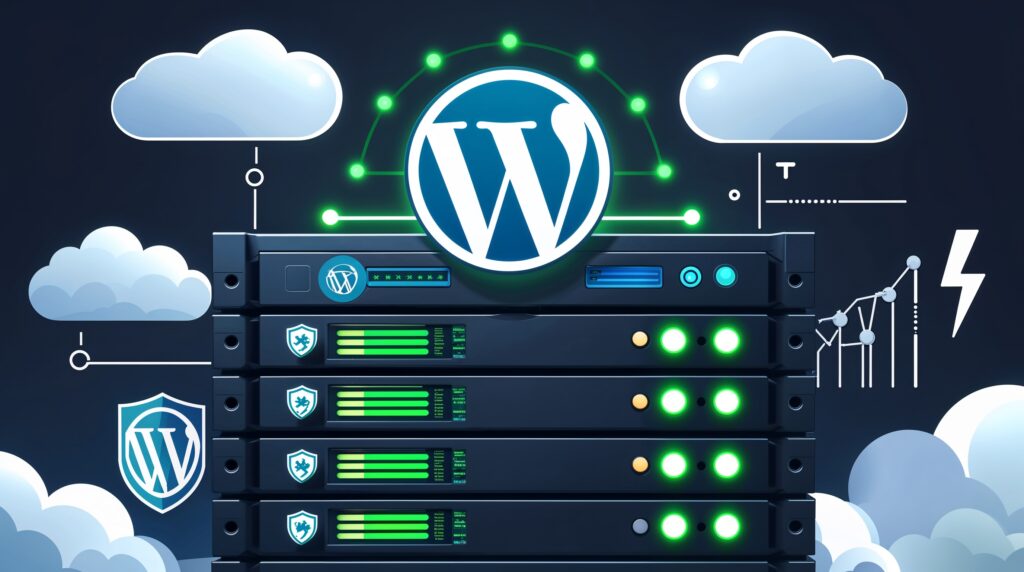Table of Contents
In today’s digital landscape, having a strong online presence is essential for businesses and individuals alike. At the heart of many successful websites is WordPress, powering over 43% of all websites on the internet. If you’re looking to build or optimize a WordPress website, understanding what is WordPress hosting and how it works is crucial. This comprehensive guide will explore everything you need to know about what is WordPress hosting, its benefits, different types, and how to choose the right WordPress hosting provider for your website needs. From WordPress server requirements to domain name configuration and WordPress installation processes, we’ll cover all aspects of WordPress site hosting.
What is WordPress Hosting? The Definitive Explanation
What is WordPress hosting exactly? WordPress hosting is a specialized web hosting service optimized specifically for WordPress websites. Unlike general web hosting services, WordPress hosting environments are configured with the exact specifications needed to run WordPress efficiently, securely, and at peak performance. These hosting solutions come with pre-installed WordPress CMS software, automatic WordPress updates, WordPress security measures, and optimized server configurations—all designed to provide the best possible experience for WordPress site owners and their visitors. Whether you’re running a WordPress blog, an eCommerce store with WooCommerce, or a business website, proper WordPress web hosting is essential for optimal functionality.
Many people ask what is WordPress hosting compared to regular hosting, and the answer lies in the specialized optimizations and WordPress-specific features that make it uniquely suited to the popular content management system.
Key Features of WordPress Hosting
When exploring what is WordPress hosting, you’ll find these essential features:
- Pre-installed WordPress: Most WordPress hosting providers automatically install the WordPress core software, saving you setup time.
- Optimized Performance: Servers configured specifically for WordPress’s requirements, resulting in faster loading times.
- Enhanced Security: Specialized security features to protect against WordPress-specific vulnerabilities and threats.
- WordPress-specific Support: Technical assistance from staff familiar with WordPress-specific issues.
- Automatic Updates: Many providers handle WordPress core, theme, and plugin updates automatically.
- Regular Backups: Automated backup systems to prevent data loss.
- One-click Staging Environments: Easily test changes before implementing them on your live site.
Types of WordPress Hosting
When researching what is WordPress hosting, you’ll encounter several distinct types, each offering different levels of performance, control, and cost:
1. Shared WordPress Hosting
What it is: Multiple websites share resources on a single server.
Pros:
- Most affordable option (typically $3-$15/month)
- Easy to set up and manage
- Good for beginners and small websites
- Minimal technical knowledge required
Cons:
- Limited resources
- Performance can be affected by other sites on the server
- Less control over server environment
- Not ideal for high-traffic websites
Best for: Bloggers, small businesses, and beginners with lower-traffic websites who are just learning what is WordPress hosting.
2. Managed WordPress Hosting
What it is: A premium service where the provider handles all technical aspects of running WordPress.
Pros:
- Excellent performance optimizations
- Enhanced security measures
- Automatic updates and backups
- Expert WordPress support
- Staging environments
- Scalability during traffic spikes
Cons:
- Higher cost ($20-$100+/month)
- Some restrictions on plugin usage
- Less server control than VPS or dedicated options
Best for: Business websites, professional bloggers, and anyone wanting a hands-off experience with premium performance. If you’re wondering what is WordPress hosting at its best, managed hosting often represents the gold standard.
3. VPS (Virtual Private Server) WordPress Hosting
What it is: A virtual server that gives you dedicated resources within a larger physical server.
Pros:
- Dedicated resources (CPU, RAM, storage)
- Greater control and customization
- Better performance than shared hosting
- Ability to handle moderate to high traffic
- Root access to the server
Cons:
- Requires more technical knowledge
- More expensive than shared hosting ($20-$100/month)
- You manage more aspects of server maintenance
Best for: Growing websites with increasing traffic, developers who need more control, and businesses requiring better performance who have a good understanding of what is WordPress hosting on a technical level.
4. Dedicated WordPress Hosting
What it is: An entire physical server dedicated to your WordPress site(s).
Pros:
- Maximum performance and resources
- Complete control over server environment
- Highest level of security
- Ability to handle very high traffic volumes
- Custom server configurations
Cons:
- Most expensive option ($100-$500+/month)
- Requires advanced technical knowledge
- Responsibility for server management (unless managed service is included)
Best for: Large enterprise websites, high-traffic sites, and businesses with specific compliance requirements who need the ultimate answer to what is WordPress hosting for high-performance sites.
5. Cloud WordPress Hosting
What it is: WordPress hosting using cloud infrastructure across multiple virtual servers.
Pros:
- Excellent scalability
- Pay-as-you-go pricing
- High reliability and uptime
- Good performance
- Ability to handle traffic spikes
Cons:
- Can become expensive with high resource usage
- May require some technical knowledge
- Pricing can be less predictable
Best for: Websites with variable traffic patterns, businesses needing scalability, and sites requiring high reliability. For those asking what is WordPress hosting in a cloud environment, it offers a flexible, scalable solution.

Why Choose WordPress-Specific Hosting?
Understanding what is WordPress hosting and its benefits can help you make better decisions for your website. While general hosting services can run WordPress, specialized WordPress hosting offers significant advantages:
1. Optimized Performance
What is WordPress hosting optimization? WordPress hosting servers are specifically configured for WordPress’s requirements. This optimization includes:
- PHP configuration optimized for WordPress
- Advanced caching mechanisms
- Content Delivery Network (CDN) integration
- Database optimization for WordPress queries
- Server-level caching
These optimizations result in significantly faster page load times, which improves user experience and SEO rankings.
2. Enhanced Security
WordPress websites face unique security challenges due to their popularity. When considering what is WordPress hosting security, these providers implement specialized measures:
- WordPress-specific firewall rules
- Malware scanning and removal
- Plugin vulnerability detection
- Automatic WordPress core updates
- IP blocking for suspicious activities
- Regular security patches
3. Expert Support
A key consideration when examining what is WordPress hosting support: WordPress hosting support teams have extensive knowledge of WordPress-specific issues:
- Troubleshooting plugin conflicts
- Theme customization assistance
- WordPress core functionality support
- Database optimization guidance
- Performance tuning expertise
4. Time-Saving Features
When evaluating what is WordPress hosting efficiency, these services typically include features that save website owners significant time:
- One-click WordPress installations
- Automatic backups and restore points
- Staging environments for testing
- Built-in caching solutions
- Automated WordPress updates
How to Choose the Right WordPress Hosting
Selecting the appropriate WordPress hosting solution depends on several factors:
1. Assess Your Website Needs
Before choosing a hosting provider, when determining what is WordPress hosting that’s right for you, consider:
- Expected Traffic Volume: Higher traffic requires more robust hosting.
- Budget Constraints: Balance cost against features and performance.
- Technical Expertise: Determine how much management you want to handle yourself.
- Growth Projections: Choose a solution that can scale with your site.
- Website Purpose: E-commerce sites have different requirements than blogs.
2. Essential Features to Look For
Regardless of the hosting type, when investigating what is WordPress hosting must-haves, ensure your provider offers:
- Reliable Uptime: Look for 99.9% or higher uptime guarantees.
- Sufficient Storage: Consider your media and content needs.
- Adequate Bandwidth: Ensure you can handle your expected traffic.
- WordPress-Optimized Environment: PHP 8.0+, MySQL 5.7+ or MariaDB.
- SSL Certificates: Essential for security and SEO.
- Regular Backups: Automated with easy restore functionality.
- Strong Security Measures: Malware scanning, firewalls, etc.
- Staging Environment: For testing updates safely.
- Quality Support: 24/7 availability through multiple channels.
3. Research Provider Reputation
Before committing, when researching what is WordPress hosting provider quality:
- Read independent reviews from current customers
- Check uptime performance history
- Test support responsiveness
- Look for WordPress-specific expertise
- Verify refund policies and money-back guarantees
Common WordPress Hosting Issues and Solutions
Even with specialized hosting, you may encounter some challenges when implementing what is WordPress hosting. Whether you’re using a WordPress hosting plan from a top WordPress host or setting up a self-hosted WordPress site, here are common issues and their solutions:
1. Slow Loading Times
Possible causes:
- Unoptimized images
- Too many plugins
- Inefficient database
- Inadequate hosting resources
Solutions:
- Use image optimization plugins
- Implement caching
- Clean your database regularly
- Upgrade your hosting plan if necessary
- Use a CDN for global audiences
2. Security Vulnerabilities
Possible causes:
- Outdated WordPress core, themes, or plugins
- Weak passwords
- Insecure hosting environment
Solutions:
- Keep all components updated
- Use strong, unique passwords
- Implement two-factor authentication
- Install security plugins
- Choose a host with strong security measures
3. Downtime Issues
Possible causes:
- Shared hosting resource limitations
- Server failures
- Traffic spikes exceeding resources
Solutions:
- Upgrade to more reliable hosting
- Choose hosts with redundant systems
- Implement proper caching
- Optimize your site for efficiency
What is WordPress Hosting vs. Regular Web Hosting?
When deciding between WordPress-specific hosting and general web hosting, consider these key differences:
| Feature | WordPress Hosting | Regular Web Hosting |
|---|---|---|
| WordPress Optimization | Servers specifically tuned for WordPress | Generic server configuration |
| Performance | Better for WordPress sites | May require manual optimization |
| WordPress Support | Specialized WordPress expertise | General technical support |
| Security | WordPress-specific security features | Generic security measures |
| Price | Generally higher cost | Often less expensive |
| Control | May limit some plugins/features | Typically fewer restrictions |
| Automatic Updates | Often included | Usually manual |
| Pre-installed WordPress | Yes | Manual installation required |
Cost of WordPress Hosting
What is WordPress hosting pricing like? WordPress hosting costs vary significantly based on the type and provider:
- Shared WordPress Hosting: $3-$15/month
- Managed WordPress Hosting: $20-$100+/month
- VPS WordPress Hosting: $20-$100/month
- Dedicated WordPress Hosting: $100-$500+/month
- Cloud WordPress Hosting: Pay-as-you-go, typically $10-$100+/month
Additional costs may include:
- Premium theme licenses ($30-$200)
- Premium plugin subscriptions ($50-$300/year)
- Domain name registration ($10-$20/year)
- CDN services ($0-$100+/month)
- Developer customizations (varies widely)
Top WordPress Hosting Providers in 2025
Based on current market performance and customer satisfaction, these are the leading WordPress hosting providers to consider in 2025:
- Hosting.com (formerly A2hosting): Known for their impressive speed optimizations and excellent customer support, Hosting.com has built upon A2hosting’s solid reputation to offer robust WordPress hosting solutions for businesses of all sizes.
- Stablepoint: A rising star in the WordPress hosting space, Stablepoint delivers exceptional reliability with advanced security features and performance-focused infrastructure, making it ideal for growing businesses.
- Webcentral: With data centers strategically positioned globally, Webcentral offers superior performance for international audiences along with comprehensive WordPress management tools and expert support.
- SiteGround: Consistently rated among the top WordPress hosting providers, SiteGround continues to impress with their cutting-edge technology stack, WordPress-specific optimizations, and outstanding technical support.
- Fixed.net: Specializing in high-performance WordPress hosting, Fixed.net offers innovative caching solutions, robust security protocols, and flexibility that appeals to both developers and business owners.
Best Practices for WordPress Hosting
To get the most from your WordPress hosting, understanding what is WordPress hosting optimization:
- Regular Maintenance:
- Keep WordPress core, themes, and plugins updated
- Perform regular database optimizations
- Remove unused plugins and themes
- Security Vigilance:
- Use strong passwords and change them regularly
- Implement two-factor authentication
- Limit login attempts
- Use security plugins
- Performance Optimization:
- Optimize images before uploading
- Implement caching
- Minimize plugin usage
- Use a CDN for global audiences
- Backup Strategy:
- Maintain multiple backups in different locations
- Test restore processes regularly
- Backup before major updates
Conclusion: What is WordPress Hosting for Your Future?
What is WordPress hosting if not a specialized environment designed to get the most out of the world’s most popular content management system? The right WordPress hosting solution can dramatically impact your website’s performance, security, and ease of management. From WordPress installation to WordPress updates, database management, and cPanel access, quality WordPress web hosting makes everything easier.
When choosing WordPress hosting, consider your specific needs, technical expertise, budget, and growth projections. Whether you opt for shared WordPress hosting plans as a beginner, WordPress managed hosting for a business-critical site, or WordPress VPS hosting for greater control, understanding the differences between hosting types will help you make an informed decision about what is WordPress hosting that suits your needs. Remember that the best WordPress hosting providers offer features like one-click WordPress installations, WordPress multisite capability, and expert WordPress support.
By selecting the appropriate WordPress hosting solution and following best practices, you’ll create a solid foundation for your website to thrive in today’s competitive online landscape.
FAQs About What is WordPress Hosting
Q: What is WordPress hosting and how is it different from regular hosting? A: WordPress hosting is specially optimized server environments configured to run WordPress websites with maximum efficiency, security, and performance. Unlike regular shared hosting or general web hosting, it includes WordPress-specific features like WordPress pre-installation, optimized PHP settings, MySQL database optimization, WordPress automatic updates, and specialized WordPress technical support. WordPress-specific hosting often includes WordPress themes, WordPress plugins management, and WordPress security features not found in standard hosting packages.
Q: Can I switch hosting providers without losing my WordPress site? A: Yes, you can migrate your WordPress site between hosts. Most WordPress hosting providers offer migration services, either free or for a fee. The process typically involves moving your files, database, and configuring your domain settings.
Q: Do I need WordPress hosting specifically, or will regular hosting work? A: While WordPress can run on standard hosting, WordPress-specific hosting offers optimized performance, enhanced security, and specialized support that can save you time and improve your site’s performance.
Q: What is WordPress hosting capacity for traffic? A: Traffic capacity varies by hosting type. Shared hosting may handle 10,000-25,000 monthly visitors, managed WordPress hosting can support 100,000+ visitors, while VPS, cloud, or dedicated solutions can scale to millions of visitors with proper configuration.
Q: Will WordPress hosting improve my SEO? A: Yes, indirectly. WordPress hosting can improve page load speed and uptime—both significant factors in search engine rankings. However, hosting is just one of many factors affecting SEO.
Q: Can I host multiple WordPress sites on one hosting plan? A: Many WordPress hosting plans allow multiple websites, but check the specific limitations of your chosen plan. Some entry-level plans restrict you to one site, while others permit unlimited WordPress installations.
Q: How often should I back up my WordPress site? A: For active websites, daily backups are recommended. If your site changes less frequently, weekly backups may be sufficient. Many WordPress hosting providers include automated backup systems.
Q: What is WordPress hosting worth in terms of cost vs. benefit? A: For business websites, e-commerce stores, or anyone valuing time over money, WordPress hosting is usually worth the investment. The enhanced performance, security, and support can provide significant returns through improved user experience and reduced maintenance time.




